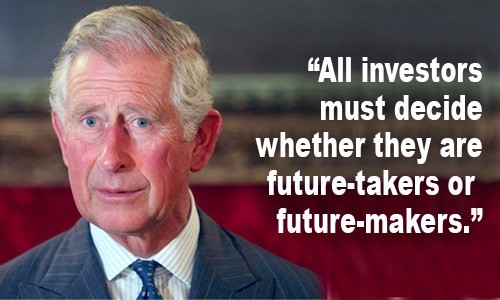

The heir to the British throne, speaking to a gathering of some of the world’s leading investors controlling billions of dollars’ worth of funds, said it’s vital that finance markets send a strong signal to politicians about the need for a global agreement on climate change.
Prince Charles said global warming is an increasing source of risk to the financial community, and investing in projects that will help the world stay within a 2˚C rise in temperatures over pre-industrial levels need not hurt investment returns.
“All investors must decide whether they are future-takers or future-makers,” he said.
https://twitter.com/billmckibben/status/659584825041543168 is a huge investment space.”
Although the assembled investment community seemed receptive to reconsidering their investment strategies, there were those who questioned the relative scale of the divestment campaign and speed of the shift to a decarbonised economy.
Market Share
The London stock exchange, one of the world’s biggest share markets, is still dominated by fossil fuel-related stocks, which account for 30 percent of the total value of the main index.
Some fund managers expressed concern about what they saw as a lack of investment products in the low carbon sector. Others said there was still not enough expertise about renewables and other decarbonised projects among firms managing investment funds.
“The fossil fuel companies have immense financial power and the lobbyists that support them are still very strong,” said one of those at the meeting.
“Big changes in the direction of investments are taking place, but it’s the pace of change that’s the important thing.
“And when you talk about the challenge of climate change, time is not on the world’s side.”
YOU MIGHT ALSO LIKE
It’s Time to Jump on the Train to the Future: All Aboard the Low Carbon Express
Remarkable Team of Scientists Run/Bike From North and South Poles to Paris Demanding Climate Action
Oslo Becomes First Capital City in the World to Divest From Fossil Fuels

 233k
233k  41k
41k  Subscribe
Subscribe 